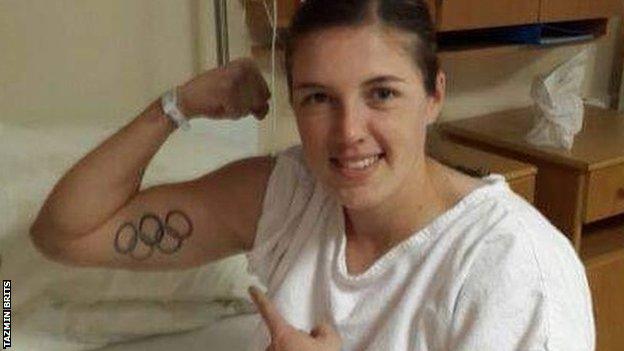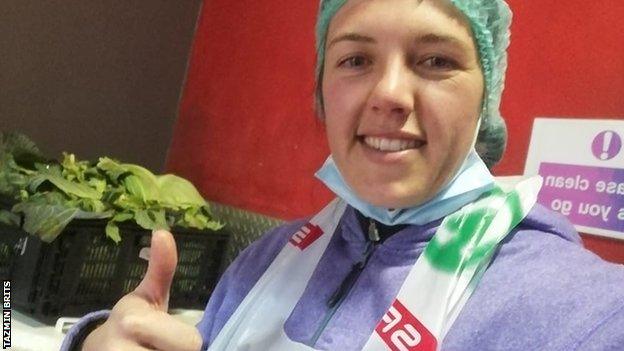Women's World Cup: Tazmin Brits' redemption from crushed Olympic dreams
- Published

Tazmin Brits spent three months in hospital after the car crash that ended her chances of going to London 2012
ICC Women's World Cup |
|---|
Dates: 4 March - 3 April. Host country: New Zealand |
Coverage: Test Match Special commentary on BBC Sounds and the BBC Sport website on 20 matches, plus live text commentary with in-play clips on selected matches on the BBC Sport website and app. Tournament schedule |
Warning: This article contains themes of suicide and self harm
Despite the devastating physical impact, Tazmin Brits can clearly remember the moment that changed her life.
The song on the radio. The smell of the dirt. How she rolled across the ground. Seeing her javelin spikes flying through the air.
It was November 2011. In the few seconds it took her car to career off the road, Brits' Olympic dream was crushed.
What followed was seven years spent "in a hole" so deep she contemplated taking her own life.
Now, in a remarkable story of resilience and redemption, she is preparing to play for South Africa at the Women's World Cup in New Zealand.
"I'm trying to keep myself composed, but I want to stand on my balcony screaming that I'm at a World Cup," says the 31-year-old batter. "I'd sleep with my Proteas jersey if I could."
Originally from Stilfontein, a mining town to the south-west of Johannesburg, a life in sport was always likely for Brits, whose mother played tennis and father and older brother played rugby.
While she tried to compete with boys in football and rugby, as well as playing hockey and netball, it was with the javelin that she really excelled.
In 2007, a 16-year-old Brits was crowned world junior champion in Ostrava, Czech Republic. At the same event, 2012 Olympic champion Kirani James won silver in the boys' 400m.
"I had one throw left," recalls Brits. "I heard my mum in the background. She gets everywhere. 'Come on Taz!' It psyches you up.
"I started a clap and the whole stadium was clapping.
"I threw this thing, screamed at the line, looked and was wondering 'is this enough'? When it came up on the board, I went crazy. I took the South African flag for a lap of honour. It was a great experience."
Brits, who has the Olympic rings tattooed on the inside of her right bicep, was set for the 2012 Games in London after throwing the qualifying distance.
Eight months before she could get there, Brits was driving home from a night out with friends. She glanced down at her phone and lost control of the car.
As she tried to correct the steering to get back on to the road, it set the car into a roll. She was not wearing a seatbelt and was thrown through the window. The car landed on her, causing a broken pelvis, dislocated hip and burst bladder.
"I tried to move," she says. "I was saying to myself 'get up, get up', but realised I couldn't feel my legs because of me breaking my pelvis.
"I thought I might have been paralysed. When I woke up in hospital, I could hear my mum crying.
"The first thing you do is you feel for your legs. You check, you lift up the blanket. Is everything still OK?"
Brits was in hospital for three months and was only able to leave in a wheelchair. Despite the extent of her injuries, she still believed she could make it to London.
"That's how crazy I was," she explains. "I was telling myself that my body might not be right, but in my mind I still know how to throw.
"I had to teach myself to pull up to put the pan under me to pee, or get off the bed to get onto a commode. I had to teach myself to walk. When I got home my mum had to shower and dress me. They said it would take a year to run, but I did it in seven months.
"You always want to be one of those miracle stories, where you prove someone wrong. I'm still not 100% functional in certain things, but daily life I can do."
Brits' recovery was complicated by bone growing over a screw in her pelvis, requiring further surgery and rehab.
Despite not believing those who initially told her that she would not throw again, London came and went, Brits no longer had the javelin and her mental state spiralled.
"You can't explain the trauma someone goes through," she says.
"After a few months, friends and family go on with their lives. They expect you to do the same thing, so you fight a battle with yourself.
"You are so used to that thing. You hold on to it. If that has gone or is taken out of your life, it can't be replaced. There is nothing else for you."

Brits worked as a waitress and in a grocery store in the time after her car accident
Life as a professional athlete over, Brits worked as a waitress and in a grocery store, only to face regular reminders of her former life.
"People would say 'aren't you that girl who throws the javelin?', she recalls.
Brits spent time with psychiatrists, but continued to fall. Suicidal thoughts entered her head on how she might end her life. "Luckily, nothing planned out," she said.
Throughout this time, Brits had cricket, which she says was for "socialising and having fun". Only when she confronted the javelin again, in January 2018, did she start to turn her life around.
"I thought 'it's a new year, this is me. I'm going to train again.'
"I had to go dust off my javelin because it had spider webs over it. I went to my old high school and was so eager I didn't bother going through the routine of throwing something light, like a tennis ball.
"I picked up the javelin and I threw. I tried to measure with my strides. 'OK, this is about 40m. I still feel fine, let's go again'. I ended up spending two or three hours there.
"I was thinking 'who are these people telling me I can't throw?' I got in the car, put my favourite song on loud and rode home thinking 'I've got this. I'm making a comeback.'"
Brits did return, winning some low-level competitions. However, while she was back throwing the javelin, her cricket was also steadily improving. Runs came at provincial level and Brits was fast becoming one of the best batters on the domestic circuit.
The javelin career was to come to another halt, this time in happy circumstances.
"There was a week of provincial matches where I was in the top three highest run-scorers. At the end, I got a call from the management. They were asking what size I wear, what number I wanted, to say they wanted me to join the Proteas' emerging players," explains Brits.
Brits made her South Africa debut in a Twenty20 against Bangladesh in May 2018. Initially seen as a specialist for the shortest format, the right-hander had a regular spot in the 50-over side for the series victory over West Indies in January and was the Proteas' third-highest run-scorer.
Although she admires fellow South African Quinton de Kock, Brits admits her idiosyncratic technique is more reminiscent of Australia's Steve Smith.
"I never in my life thought this would have happened," says Brits. "I might not be a javelin thrower now but, you know what, I'm representing my country.
"Once I sing the first national anthem at the World Cup, that is when it will sink in. I might have to take a whole roll of toilet paper in my pocket. You try to be brave and try not to look ridiculous. If I cry, I cry."
There is still a tinge of sadness to Brits' story, following the death of her father as a result of Covid-19 in March of last year.
"He'd have been very proud," says Brits, her voice cracking with emotion. She explains she carries with her a small red figure of a man that her father once found in the sea.
Despite her loss, Brits can appreciate the way her story has turned out so differently from a flirtation with tragedy.
"This is my second chance," she says. "I'm grateful just to be alive.
"What would I say to the Tazmin that was lying in hospital, or who sized up the cupboard?
"I'd say 'We made it. It was worth it.'"
Help and support on a range of issues is available via BBC Action Line here.